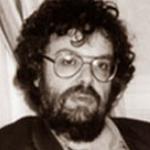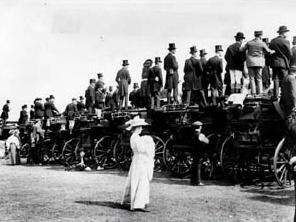
Stephen Poliakoff Interview
with Mobil Masterpiece Theatre

Where did you get the idea for Shooting the Past?
There's a good story behind it...The idea came from an archive in England that belonged to one of the big studios...just outside London. The studio closed in the '60s, then EMI bought it - the British music company. Anyway it changed hands again and, in the early '90s, they were going to bulldoze the site and destroy all the photos. There was an art director who tried to get somebody in England to rescue the collection, and she failed. Finally she got the George Lucas Foundation to take it. So, somewhere in America, this collection is sitting in his archive; I think it's in the desert somewhere...it's just a rather haunting image -- this collection of British pictures that are now somewhere in another country. That was the grain of the idea...
Do you think that archives like the one in the film really exist -- millions of pictures sitting on dusty shelves, no climate control, no special care, not computerized or documented?
Oh, yes, absolutely, yes. Absolutely. If anything, it's slightly understated ...[LAUGHTER]. The biggest collection in England, the Hulton, which is the collection we used in the film ...even they, the premier collection, didn't have everything on line. They were working their way through it when we worked with them.
There was a collection (which has just been sold, actually) very like the one in the film, in a period house in the middle of London ...very, very dusty ...It was an old ballet school, all covered up with pictures. That was literally like the archive you see in the film, but much worse, much less tidy. And yet it was a famous collection. But it was a mess. So, yes, it's not in any way impossible ...it's perfectly realistic that pictures were kept like that and are kept like that.
As I said, as I was shown through the Hulton, there were people who had worked there for years who would look up and shout, "That's absolute rubbish, I'm telling you, rubbish!" And then they'd go back to their work. [LAUGHTER]. It was terribly uncomputerized. But they could find what they were looking for, they knew where a picture was because they had their system, it was invented ...I think it was in the '20s ...all the cross-referencing. It was used until they started putting it all on computer ...
It does work, actually, because like Oswald in the story, when I was shown the Hulton they said, "Think of a picture and we'll find it for you. Whatever picture you want; you think of something. And we'll find it within 10 or 15 seconds ..." And they'd find it. They did.
Was it difficult to get Hulton to work with you, to provide all these images?
No, it wasn't. They were very helpful and they were very resourceful
The Hulton used to belong to the BBC ...every documentary they make uses photos almost by definition. So now they have to pay the Hulton a hefty whack for every photo they use, and of course it was all theirs once, they owned it. They asked "Why are we housing all these pictures, you know, in some building? Why don't we sell it off and then have a sort of preferential rate?" So they sold this fantastic collection of pictures ...about 10 years ago. Now its value has shot through the roof.
Do you think that seeing this kind of archive in the film is something of a revelation to some people, who didn't realize that such things existed? Particularly the range of photographs --
Yes, the range of photos, I think. People obviously don't think about archives until they need a collection of photos ...it's not something that reaches people's sonar a lot, unless they happen to be involved for some reason. But everybody's interested in photos because everybody's got photos and everybody's got photos from their past, from their family.
In the film, the Fallon Photo Library has 10 million pictures. 10 million is a lot of pictures but Hulton has got 30 million. And not just pictures. They've got an enormous amount of ephemera, as well -- old posters, old theater programs, old opera programs, old flyers -- an enormous amount of ephemera ...
There's a scene in the film where Oswald goes to have his pictures developed and he rifles through some personal snapshots. That does make a connection -- the snapshots of daily life that we toss around today are the archives of tomorrow.
Yes, that's a very important scene, that's right. I've got a new play, just opened at the National, (Note: Poliakoff's Remember This premiered at London's National Theatre in October of 1999) which is about how video fades, you know, the personal record of one's life. You have to keep transferring it for it to last more than a generation. And so all these millions and millions of pictures on video, video people take of their children, may not be around for future generations. Photos certainly will. So, funny enough, the photos are a much more permanent record of the past than what we're dealing with now. Also, obviously, people don't print out all their e-mails. In the 19th century everybody wrote letters and they kept them all.
Photography, the still image, is going to be I think just as important for people in a hundred year's time, looking back at us now. Which is funny since this has been the century of the moving image. But there's also the ability of the still image to capture a moment ...
It must have been fascinating to work with all these pictures. In every scene you see some intriguing image in the background ...
Yes, it was very easy to get distracted, there were so many pictures. There were thousands and thousands of pictures on the set, yes. It was interesting, and I kept thinking, "Oh, this is a good picture." (LAUGHTER]
The stories told with pictures, within the film, are a very different kind of presentation. They aren't just a slide show. There was movement within the form ...
Yes, that's right. Well, that was one of the ideas of the pieces -- I wanted to see if one could use still images to tell a story and yet not make it look just like a sequence of pictures. I've always been very interested in the fact that, when a film camera looks at a photo, it's almost -- for the first split second -- it's very, very interesting. There is an in-built mystery for a second, then if the picture's dull or the content's dull, you lose interest. But pictures are terribly powerful. And you very rarely see historic photographs.
Did you have a favorite?
My favorite, the picture that I really love in the thing, is one you see when Marilyn is looking through glass slides, trying to find a picture of Anderson's grandmother. There's a fantastic picture of men at the races, all these men standing on their carriages to watch this race. Behind them is this one woman with her parasol. It's an incredibly beautiful picture. It's a very strongly haunting image, really. All these men watching the horses, this one woman behind them. I love that image.

How would you define this film?
My work is always perhaps defined as off-beat, quirky. But I mean the whole point is to do something people haven't seen before. It isn't a comedy; there is a serious, more troubling and more obviously upsetting side. No comedy would have had the sequence about Lilly. Nevertheless there's a tradition of various films of rather un-worldly characters being interrupted by the outside world. There have been a number of famous British films made in that tradition. I suppose it is the un-worldly, slightly eccentric characters that have been locked away in their world. But on a deeper level, all organizations -- every school and hospital, every bank, every tiny structured firm, especially if they've been going for awhile ...struck by change and having to adapt would struggle. Often a lot of people are fired not because of their lack of ability or knowledge, but because they don't fit into a new structure. Or a new way of operating. People of a certain age are particularly vulnerable.
It's a drama about people having to cope with change their world, really. They're actually very lucky, if you think back. There's isolated splendor without much commercial pressure at all. With the cooks ...There is almost more catering staff than there are people working there ... [LAUGHTER]. These people are privileged and they can be irritating as well as endearing, very difficult. Oswald's approach was to say to himself, "There's nothing we can do so we might as well still be here and just ignore it, let them deal with it." There's a certain method in his madness, obviously. ...
Marilyn was the captain of the ship.
Yes. And there's a rather passionate woman underneath this rather strict school-marm appearance.
And Oswald, the second in command, often challenged the approach that she took, would you say?
Yes. Obviously, they worked as a team, in that Oswald's extraordinary knowledge of the collection was greater than Marilyn's although Marilyn is very knowledgeable about the collection. But Marilyn is obviously much more predictable to the outside world. So as he says, she's good at dealing with clients, with people, and she would be very cordial when they came to the collection. She's much more genteel in appearance and things of that sort. Oswald, you know, might be quite rude to them. "If you don't know what you're looking for, I can't help you," you know, he'd say that sort of thing. "If you're precise, I can help you." [LAUGHTER]
Obviously it's a generalization, there are many exceptions. But nevertheless, it is true that this particular sort of person -- terribly abrupt, very difficult to deal with can be someone who has extraordinary knowledge, often not written down. In their head. Which people also find very difficult to cope with.
Is the topic of people coping with technology a theme of in your work?
There is a theme of coping with change in the modern world; I'm particularly interested in how it affects people. I thought about writing about young people, particularly, the urban world ...And then it's broadened out to new directions. But, basically, the fact that the world's hurtling along, the fact that we're talking here about technologies that didn't exist a few years ago...the internet wasn't even on people's horizon until recently ...so that's an amazing pace of change and it affects everything, everybody. It affects the way we relate to our children. That is a unique thing because when I was brought up people seemed to have such strong ideas of what your life should be...
Because I come from a family of scientists I'm very interested in discovery. I'm certainly not necessarily a technocrat or a reactionary because I love science; I've written about science quite a lot and I love the quest for discovery. I wrote a play [Blinded by the Sun] that was actually about the fact that scientists are just like us, basically. I tried to show that people in the world of science are just people ...I mean, it's like any other world. So, I'm very interested in change.